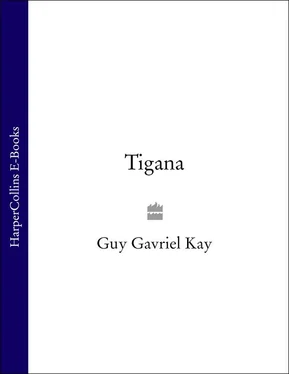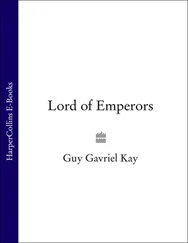In the closet Devin and Catriana clung to each other, sharing a breathless laughter. Then a newer urgency came over Devin, and it seemed to him it was in her as well, and there was suddenly nothing in the peninsula that mattered half so much as the gradually accelerating rhythm of the movements they made together.
Devin felt her fingernails splay outwards on his back. Feeling his climax gathering he cupped his hands beneath her; she lifted her legs and wrapped them around him. A moment later her teeth sank into his shoulder a second time and in that moment he felt himself explode, silently, into her.
For an unmeasured, enervated space of time they remained like that, their clothing damp where it had been crushed against skin. To Devin the voices from the two rooms outside seemed to come from infinitely far away. From other worlds entirely. He really didn’t want to move at all.
At length however, Catriana carefully lowered her legs to the ground to bear her own weight. He traced her cheekbones with a finger in the blackness.
Behind him the lords and merchants of Astibar were still shuffling past the body of the Duke so many had hated and some few had loved. To Devin’s left the younger generation of the Sandreni ate and drank, toasting an end to exile. Devin, wrapped close with Catriana, still sheathed within her warmth, could not have hoped to find words to say what he was feeling.
Suddenly she seized one of his tracing fingers and bit it, hard. He winced, because it hurt. She didn’t say anything though.
AFTER THE SANDRENI LEFT, Catriana found the latch and they slipped out into the room again. Quickly they reorganized their clothes. Pausing only long enough to seize a chicken-wing apiece, they hastily retraced their path back through the rooms leading to the stairway. They met three liveried servants coming the other way and Devin, feeling exceptionally alert and alive now, claimed Catriana’s fingers and winked at the servants as they passed.
She withdrew her hand a moment later.
He glanced over. ‘What’s wrong?’
She shrugged. ‘I’d as soon it wasn’t proclaimed throughout the Sandreni Palace and beyond,’ she murmured, looking straight ahead.
Devin lifted his eyebrows. ‘What would you rather they thought about us being upstairs? I just gave them the obvious, boring explanation. They won’t even bother to talk about it. This sort of thing happens all the time.’
‘Not to me,’ said Catriana quietly.
‘I didn’t mean it that way!’ Devin protested, taken aback. But unfortunately they were going down the stairs by then, and so it was with a quite unexpected sense of estrangement that he paused to let her re-enter the room before him.
More than a little confused, he took his place behind Menico as they prepared to go back out into the courtyard.
He had only a minor supporting role in the first two hymns and so he found his thoughts wandering back over the scene just played out upstairs. Back, and then back again, with the memory that seemed to be his birthright focusing like a beam of sunlight upon one detail then another, illuminating and revealing what he had missed the first time around.
And so it was that by the time it was his own turn to step forward to end and crown the mourning rites, seeing the three clergy leaning forward expectantly, noting how Tomasso struck a pose of rapt attentiveness, Devin was able to give the ‘Lament for Adaon’ an undivided soul, for he was confused no longer, but quite decided in what he was going to do.
He began softly in the middle range with the two syrenyae, building and shaping the ancient story of the god. Then, when the pipes of Alessan came in, Devin let his voice leap upward in response to them, as though in flight from mountain glen to crag to chasm brink.
He sang the dying of the god with a voice made pure in the cauldron of his own heart and he pitched the notes to rise above that courtyard and beyond it, out among the streets and squares of high-walled Astibar.
High walls he intended to pass beyond that night— beyond, and then following a trail he would find, into a wood where lay a hunting lodge. A lodge where pall-bearers were to carry the body of the Duke, and where a number of men— six, the clear voice of his memory reminded him—were to gather in a meeting that Catriana d’Astibar had just done the very best she could short of murder to prevent him learning about. He strove to turn the acrid taste of that knowledge into grief for Adaon, to let it guide and infuse the path of the ‘Lament’.
Better for both of us, he remembered her saying, and he could recapture in his mind the regret and the unexpected softness in her voice. But a certain kind of pride at Devin’s age is perhaps stronger than at any other age of mortal man, and he had already decided, before even he began to sing, here in this crowded courtyard among the great of Astibar, that he was going to be the judge of what was better, not her.
So Devin sang the rending of the god at the hands of the women, and he gave that dying on the Tregean mountain slope all he had to give it, making his voice an arrow arching outwards to seek the heart of everyone who heard.
He let Adaon fall from the high cliff, he heard the sound of the pipes recede and fall and he let his grieving voice spiral downward with the god into Casadel as the song came to its end.
And so too, that morning, did a part of Devin’s life. For when a portal of Morian’s has been crossed there is, as everyone knows, never a turning back.
Chapter IV
Escorting his father’s bier out of the eastern gate in the hour before sunset, Tomasso bar Sandre settled his horse to an easy walk and allowed his mind to drift for the first time in forty-eight intensely stressful hours.
The road was quiet. Normally it would have been clogged at this hour with people returning to the distrada before curfew locked the city gates. Normally sundown cleared the streets of Astibar of all save the patrolling Barbadian mercenaries and those reckless enough to defy them in search of women or wine or other diversions of the dark.
This was not a normal time, however. Tonight and for the next two nights there would be no curfew in Astibar. With the grapes gathered and the distrada’s harvest a triumphant one, the Festival of Vines would see singing and dancing and things wilder than those in the streets for all three nights. For these three nights in the year Astibar tried to pretend it was sensuous, decadent Senzio. No Duke in the old days—and not even dour Alberico now—had been foolish enough to rouse the people unnecessarily by denying them this ancient release from the sober round of the year.
Tomasso glanced back at his city. The setting sun was red among thin clouds behind the temple-domes and the towers, bathing Astibar in an eerily beautiful glow. A breeze had come up and there was a bite to it. Tomasso thought about putting on his gloves and decided against it: he would have had to remove some of his rings and he quite liked the look of his gems in this elusive, transitory light. Autumn was very definitely upon them, with the Ember Days approaching fast. It would not be long, a matter of days, before the first frost touched those last few precious grapes that had been left on chosen vines to become—if all fell rightly—the icy clear blue wine that was the pride of Astibar.
Behind him the eight servants plodded stolidly along the road, bearing the bier and the simple coffin—bare wood save for the Ducal crest above—of Tomasso’s father. On either side of them the two vigil-keepers rode in grim silence. Which was not surprising, given the nature of their errand and the complex, many-generationed hatreds that twisted between those two men.
Those three men, Tomasso corrected himself. It was three, if one chose to count the dead man who had so carefully planned all of this, down to the detail of who should ride on which side of his bier, who before and who behind. Not to mention the rather more surprising detail of exactly which two lords of the province of Astibar should be asked to be his escorts to the hunting lodge for the night-long vigil and from there to the Sandreni Crypt at dawn. Or, to put the matter rather more to the point, the real point: which two lords could and should be entrusted with what they were to learn during the vigil in the forest that night.
Читать дальше












